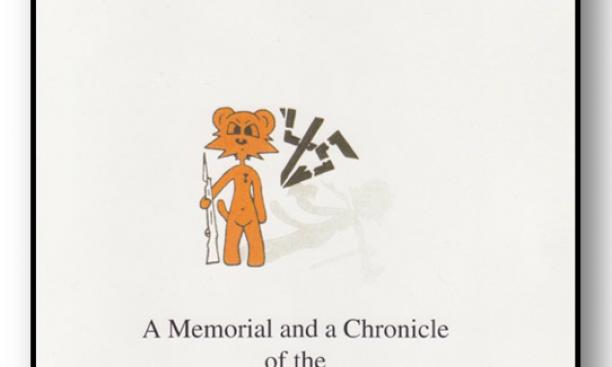




In war, there are no unwounded soldiers.
– Jose Narosky
For Your Favorite Periodical, a cover date is a sometime thing. In fact, here at History Central we don’t even have a cover, unless you count your iPad magnothingee or my pith helmet. So while this missive carries a June 1 date, you’re just as likely perusing it on May 26 or whenever, just so you can be the first to approach true enlightenment on your block, or in your cellblock, or whatever.
The only reason I mention it is that the P-rade may be going on as you read this (2 p.m. Saturday, May 28, if you’re keeping score), and that marks the point of discussion for this episode. If that sounds suspiciously like current events rather than history (which as we all know is required to be plodding and irrelevant), let me assure you we’re actually marking 70 years since a momentous transition. But as so often happens with history, we see it starkly in front of us in the P-rade, where we have to either deal with it or literally close our eyes to the wisdom of our own past.
At this year’s P-rade, the Class of 1945 joins the Old Guard.
This is the last group of Princetonians to matriculate before the bombing of Pearl Harbor. For anyone who was around back then, you don’t need to say much more. For the younger set, recall 9/11 and try to imagine yourself as a U.S. Marine at the time. Then multiply it by two. Going to war simultaneously with Germany and Japan was about as good a way to mess up your HYP weekends as you can imagine. The Class of ’45’s got messed up good and proper, and many other things they hoped for besides.
By their theoretical graduation date, 24 of them were dead.
You may or may not be an adherent of The Greatest Generation viewpoint, the idea that these are extraordinary people. My father, a World War II vet himself, felt that the times make the man, rarely the reverse. But I do want to mention something unique that the Class of ’45 left for all of us a long time ago, that you can walk over to the Class of 1935 Room at Mudd Library and cogitate on any old time you want. It’s a class book, like many others from many other classes (mostly done in conjunction with major reunions) in many outward ways, but startlingly unique.
The Class of 1945 didn’t do a fifth-reunion book. They had a good excuse: Some of their number were still undergrads. Indeed, the last to earn a Princeton A.B. received it afterward, at the 1950 Commencement, a stretch of more than six years since the first accelerated grads in February 1944. In June of 1945, the nominal Class of ’45 graduated 12 men.
In any real sense, war letters and photos were their group experience, President Harold Dodds *14’s Christmas books their common classroom. Classmates were concerned about this chaos, and an informal group resolved in 1948 to capture these extraordinary memories while they were still fresh. As it turned out, John Kauffmann ’45 had been relentlessly gathering letters and memorabilia from the class during the war with such a project already in mind. Faced with the alternative of forming a committee, the group recalled Will Rogers ("Outside of traffic, there is nothing that has held this country back as much as committees”) and handed the entire editorial load to a willing Kauffmann, who assembled the class book, published in early 1952.
Everybody’s contact information is included, per the norm. It features many grainy black-and-white pictures and the normal recollections of freshman teams (Butch van Breda Kolff ’45 played three sports), professors, and pitchers at the Nass, but the monumental class journal section – 48 pages, two-column magazine-sized – then veers into the draft, V-12 programs, close-order drills, and AWOL. Dates and events become muddled; classmates leave early, then suddenly return late, the undergraduate years stretch out to six, seven … nine. Class reunions, marriages, and graduations take place simultaneously in some weird mix of parallel dimensions.
Following are 16 pages called “Writings of War.” Fifty classmates are decorated for gallantry. Guys stuck in South Carolina lose to Yalies in poker games. They spend interminable time on troop ships. They drink expensive French champagne in the cellar of former Gestapo headquarters in Germany. Their friends die. They haul howitzers from island to island. They liberate Dachau.
But even that is not the driving impetus of the book. The beginning 52 pages consist of two-page spreads for each of 26 deceased classmates; everything else is afterthought. Stockton Bartol ’45, a highly decorated pilot, died in a raid over Germany after he was eligible for stand-down. Ben McBurney ’45 died on Okinawa; a nephew born seven weeks later is named for him. Curt Poillon ’45 died on Luzon, and is buried at Arlington next to his fellow-cavalryman father. Belgian Pierre Soesman ’45, the first to volunteer, was shot down flying for the RCAF over Le Havre. Walt Hall ’45 died with the Tenth Mountain Division in Italy and received a posthumous Silver Star; he was actually Walter Phelps Hall Jr., the elder son of legendary history professor Buzzer Hall. Before the book offers any chance of normal interaction, of collegial recognition and recollection, of business as usual, this Truth must be faced and stared down, eye-to-eye. This is a harrowing experience.
What sorts of 30-year-olds put such things together? This is a book with faces of normal fifth-reunioners, but with huge weapons, poignant decorations, mud and trauma. Many already had done the most important or dangerous things in their entire lives and knew it, and even hoped never to do anything like it again. The various elements in the Class of ’45’s Memorial and Chronicle (think about the title for a minute) have the giddiness of youth at a fifth reunion and also the finality of weariness at a 65th; in some important ways ’45 was part of the Old Guard decades before the clock said so. In contrast to most other class books you pick up, it doesn’t reflect a distinct stage of life; it shows the whole breadth of life having gone berserk on a tiny group of 600 innocent bystanders. John Kauffmann’s ability to tell a story using others’ thoughts is stunning: There is wisdom on virtually every page, but a flavor of helplessness and awe as well. Perhaps that is where Great Generations come from.
And after all of that, the Memorial and Chronicle actually may have been premature. After the book was complete, classmate John Koelsch ’45, who stayed in the Navy following World War II, was flying a rescue helicopter in Korea off the USS Princeton. On a risky mercy mission he was shot down and captured, and later died in captivity. He was awarded the Congressional Medal of Honor; the citation praises his “great personal valor and heroic spirit of self-sacrifice.” In that he was, of course, not alone.
That is something to consider during the P-rade.